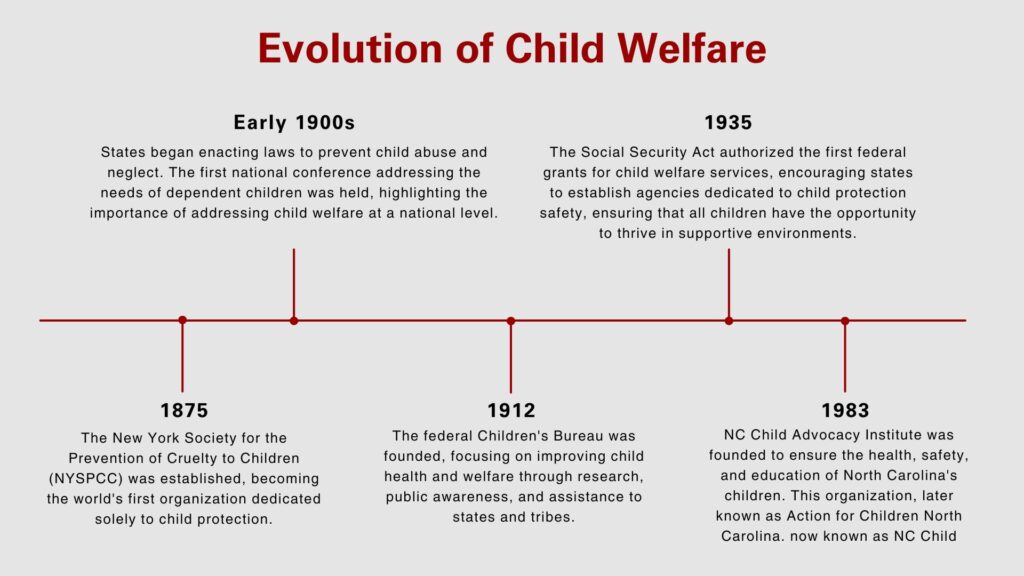Compassion Meets Action: The Impact of Social Workers
Celebrating Social Work Appreciation Month in March

March is Social Work Appreciation Month
March is Social Work Appreciation Month, a time to honor the dedication and impact of social workers. The National Association of Social Workers has chosen this year’s theme, “Social Work: Compassion + Action,” emphasizing the profession’s commitment to empathetic engagement and proactive support.
In child welfare, social workers play a pivotal role in safeguarding and uplifting vulnerable children and families. They often enter the profession with a genuine desire to make a positive difference in people’s lives. Their compassion is evident in their daily work as they provide emotional support, advocate for children’s rights, and empower families to overcome challenges. By building trusting relationships, social workers create a foundation for effective intervention and lasting change.
Celebrating the Impact of Social Workers
As we celebrate, let’s honor the contributions of social workers in child welfare, both past and present in North Carolina. Their compassion and proactive actions transform lives and strengthen communities.
- Joan Pennell: A Champion for Family-Centered Child Welfare Practices
- Joan Pennell is a prominent figure in social work, known for her advocacy of family-centered practices in child welfare. Through her work with the Center for Family and Community Engagement (CFACE), she has promoted community-based approaches that empower families and improve child welfare systems. CFACE focuses on strengthening family involvement in decision-making, ensuring services better respond to children’s needs. We’ve had the honor of interviewing Joan Pennell and are excited to share insights from the interview soon. Keep an eye out for more news articles!
- Wallace Kuralt Sr.: A Pioneer in Social Work & Child Welfare
- Wallace Kuralt Sr. was a pioneering social worker whose impact on child welfare in North Carolina remains felt today. After studying at UNC-Chapel Hill, he began his career as a caseworker in Onslow and Robeson counties. As Director of Mecklenburg County’s Social Services from 1945 to 1972, Kuralt introduced innovative programs like child development centers and substance abuse clinics, leaving a lasting legacy that continues to influence social work and child protection practices.
- Dr. Sabrina Sullenberger: Champion for Child Welfare & Social Work Education
- Dr. Sabrina Sullenberger is a respected educator and researcher focused on poverty and child welfare. She earned her Ph.D. from UNC-Chapel Hill and now teaches at Belmont University, training future social workers. Her research explores poverty’s impact on child development and advocates for evidence-based policies in child welfare. Dr. Sullenberger’s work continues to shape social work practices, promoting compassionate solutions for vulnerable children and families.
- Lisa Cauley: A Leader in Trauma-Informed Child Welfare
- Lisa Cauley, Senior Director of Child and Family Services at the North Carolina Division of Social Services, has been instrumental in implementing a trauma-informed model of child welfare across the state. Her efforts focus on addressing inequities and ensuring that child welfare practices are sensitive to the traumatic experiences of children and families. In a 2023 interview, Cauley discussed the challenges and opportunities in transforming North Carolina’s child welfare approach to be more compassionate and effective.

This month, let’s reflect on the invaluable contributions of social workers in child welfare. Their blend of compassion and action transforms lives and strengthens the fabric of our communities. Supporting social workers through adequate resources, fair policies, and public appreciation is essential for them to continue their vital work in safeguarding children and families.
How to Show Your Support This Social Work Appreciation Month
Throughout the month of March, you can demonstrate your appreciation and support for social workers and the field of social work in different ways! Some of the best ways to show your support include:
- Engage With Content on Social Media. On social media, you can like, comment, repost, and/or share your own content related to Social Work Month. Follow or repost content that includes the official hashtags for 2025: #SWMonth2025 #SocialWorkMonth #SocialWork #CompassionPlusAction. Sharing and engaging with content on social media helps spread the word and raise awareness.
- Educate Yourself. There are a lot of interesting ways to learn more about social workers and the invaluable work they do. There are many different documentaries that provide information about child welfare and social work. For example, “Placing Out: The Orphan Trains” (2008) examines the beginning of documented foster care in America.
- Register for North Carolina Social Work Advocacy Day. This one-day program is hosted in Raleigh on Wednesday, March 5, 2025 and includes social work professionals and students throughout North Carolina convening to learn the legislative process and get a “hands-on” advocacy experience by discussing important policy issues with state legislators and/or their staff in meetings.
- Send the 2025 Social Work Month Proclamation to Your City Government. Celebrate and support the Social Work Profession by proclaiming the month of March 2025 as National Social Work Month! Download the PDF version here.
For more ways to celebrate Social Work Appreciation Month, visit the National Association of Social Work Association (NASW) website or download this pdf.
A Historical Perspective: The Evolution of Child Welfare

The history of child welfare in the U.S. reflects changing societal values and a growing commitment to protecting vulnerable children. Early on, child welfare was a private concern, with communities relying on informal arrangements to care for orphan or neglected children. Children without guardians were sometimes placed in almshouses alongside adults, exposing them to harsh conditions. Without formal structures, many children were left vulnerable to exploitation and neglect.
From 1875 to 1962, the system began evolving with organized child protection efforts. A key historical event in the development of foster care in America was the “placing out” system, which was widely recognized between 1854 and 1929. During this time, orphaned, abandoned or impoverished children were relocated from urban areas to foster homes in rural regions, often by train. Advocates of placing out, including social reformers and child welfare organizations, believed that placing children in family settings would offer them better opportunities for education, stability and moral guidance. Many children, particularly those from immigrant backgrounds or impoverished urban settings, were sent to rural areas in hopes of a better life.
While the system had good intentions, the program had mixed results. Some children thrived, while others faced hardship, exploitation and emotional displacement. Notably, African American children were largely excluded from this program because of systemic racism.
Racial Disparities and the Need for Reform
African American children have long faced disparities in the U.S. child welfare system. They were often placed in kinship care instead of formal foster care due to systemic biases. Although kinship care kept children within their communities, it received less support and resources than traditional foster care. These inequities are rooted in discriminatory policies that marginalize Black families and limit their access to services. learn more about the history of child protection in the African American community by clicking here!
To address these challenges, it’s crucial to prioritize culturally responsive policies and practices that provide equitable support and opportunities for African American children and families. One name that stands out in child welfare advocacy is Fredericka Douglass Sprague Perry. She dedicated her life to improving the welfare of African American children during a time when they were often excluded from mainstream child welfare services. Learn more about her in one of the articles we wrote about Black History Month.
We have come a long way thanks to the dedication and hard work of social workers who continue to advocate for child welfare and racial equity. Their efforts have led to significant progress in policies and support systems, improving outcomes for many children and families. However, the work is far from over. Addressing racial disparities in child welfare requires continued commitment, systemic change, and a collective effort to ensure every child, regardless of race, has the opportunity to thrive.


